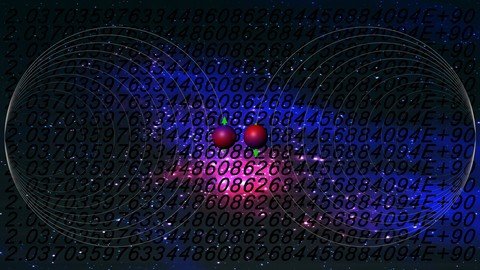
MP4 | Video: h264, 1280x720 | Audio: AAC, 44.1 KHz
Language: English | Size: 1.75 GB | Duration: 1h 20m
Less formulas- More Understanding of Quantum Computing, Quantum Codes and their Implementations on Quantum Simulators
What you'll learn
Basics of Quantum Computing with its Qiskit Implementation
Quantum gates and Quantum codes in Qiskit and Pennylane
Quantum modeling using Quantum Variational Circuits
Measurements in Quantum Computing using Quantum Simulators
NISQs and Decoherence in Quantum Computing
Building a Quantum Computer
Fundamentals of Quantum Computing
Requirements
Students would be able to learn from scratch. No Pre- requisite is required
No programming skills are required.
Description
This course would enable you to gain insight into the realm of Quantum Computing. The students would be able to learn and develop expertise in Quantum algorithms, gates and implementation of these codes. The undergraduate students would particularly find it very imperative and for realizing their final year projects and reports.
Furthermore, this course is an introduction to the fundamental concepts of quantum circuits and algorithms. The course will provide tools that allow students to implement quantum circuits and algorithms using quantum computing libraries and to run them using quantum simulators as well as real hardware.
The following topics shall be covered;
1. Quantum Computing.
2. Classical Computing vs Quantum Computing.
3. Impact of Quantum Computing on Cloud Computing.
4. Quantum Superposition & Quantum Entanglement.
5. Quantum Gates.
6. Quantum Variational Circuits.
7. Optimization through Quantum Annealing.
8. Quantum Measurements.
9. Noisy Intermediate Scale Quantum Computing (NISQs).
10. Building a Quantum Computer
11. Impact of Quantum computing in cyberspace.
12. Quantum algorithms and code examples.
13. Implementation and testing of all codes in Qiskit.
14. Quantum Robot implementation in Qiskit.
15. Quantum Financial Systems and Markets.
16. Quantum Computing for Computer Vision.
17. Quantum Computing using NLP.
18. Quantum Programming Languages including .NET platform.
At the end of the course the student will be able
To describe the differences between quantum and classic computation.
To build quantum circuits connecting different types of quantum gates.
To implement quantum circuits and algorithms using quantum programming libraries.
To run quantum circuits and algorithms using quantum simulators and real quantum computers.
To understand how to design quantum algorithms to solve multifarious problems.
Who this course is for
Beginners aspire to learn Quantum Computing from the very basics to the cutting edge topics
Learners aim to develop expertise of quantum simulators for modelling and testing
Homepage
https://www.udemy.com/course/introduction-to-quantum-computing-a-z-package-for-students/Buy Premium From My Links To Get Resumable Support,Max Speed & Support Me
Links are Interchangeable - No Password - Single Extraction



